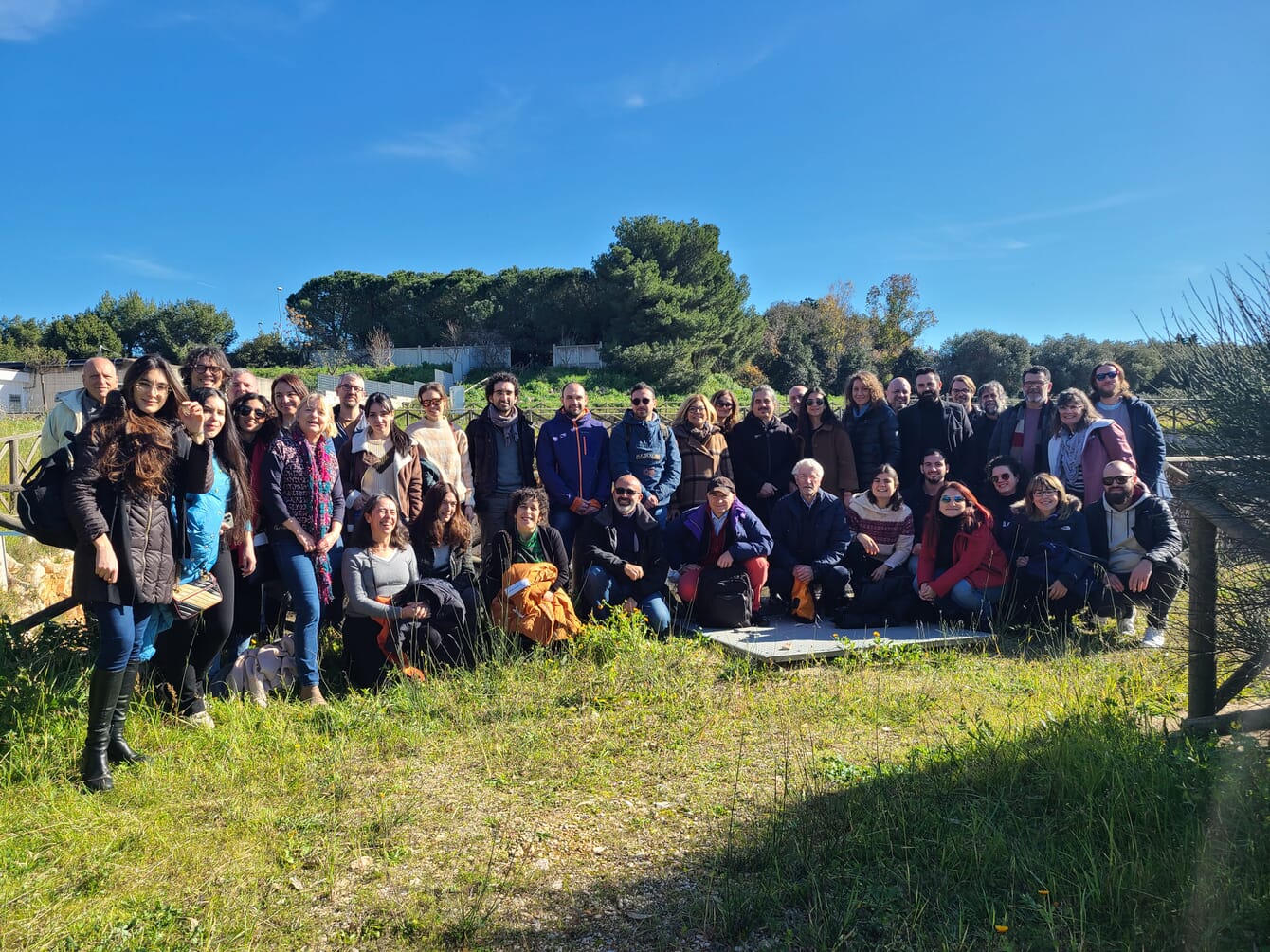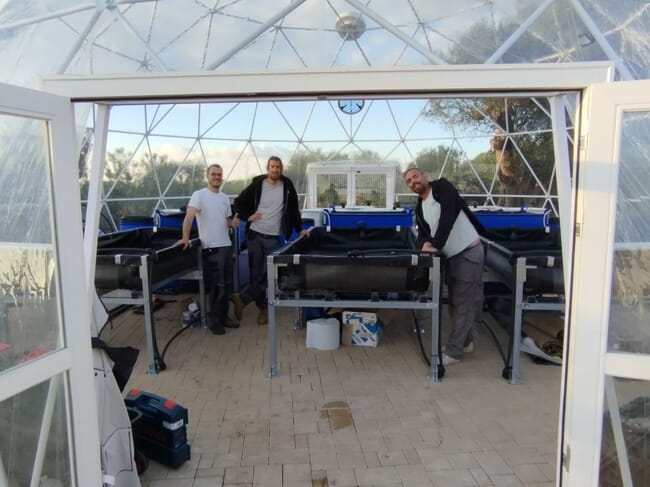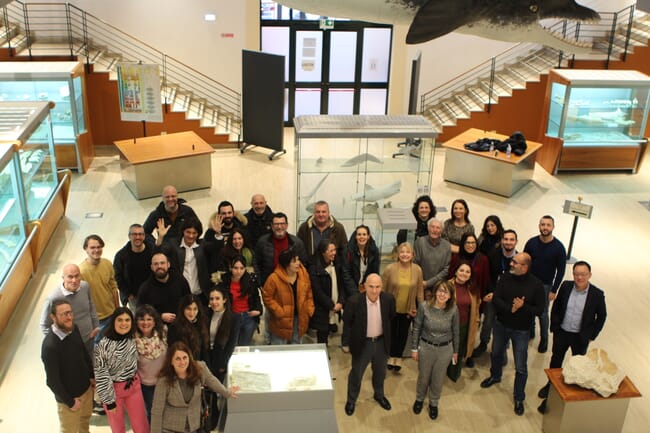
Although combining wastewater systems and aquaponics have been talked about for some time within the industries, the AWARE project is one of the first to put these ideas into practice. The project’s flagship plant is located in southern Italy at the wastewater treatment plant of Castellana Grotte (Bari). The pilot plant is due to be activated by the end of April 2024, with the fisheries systems being fully set up and live by the end of May.
It stands out as a pioneering initiative that combines these two spheres in an innovative manner. The overarching objective of the project is to “create a new farm-to-fork value chain for European economic growth”. This is achieved through the three main project streams:
- To use reclaimed water, in Europe’s first recirculation aquaponics system, to produce fish and vegetables,
- To allow waterfront and urban communities to benefit economically from the farm-to-fork value chain through new business models.
- To inform policymakers by providing scientific evidence to overcome upscaling and commercialisation barriers.
As Dr Fabio Ugolini, the project’s coordinator, explains: “The big dream is to be able to drink the reclaimed water” but current sights are set on creating a circular system of using municipality wastewater for aquaculture.
However, while the technology is there, the regulations are not and Ugolini notes that “the biggest barrier to the project is the fact that regulations for using reclaimed water to farm food destined for human consumption currently don’t really exist”.
The project is a partnership between such as universities, institutes and societies who all-share Ugolini’s vision for the use of reclaimed water.
The process
The water reclamation process employed by the AWARE project is a multi-step system designed to transform urban wastewater into a valuable resource for aquaculture. Ugolini explains that most waste water currently undergoes three primary treatment steps to meet the legal standards for discharge or irrigation.
However, the AWARE project adds an additional treatment step to eliminate any remaining trace contaminants, in order to make the water suitable for aquaponics. This fourth step involves advanced processes such as UV treatment, microfiltration, and advanced oxidation carried out in a vacuum system with lights.

© AWARE
An innovative approach
Ugolini highlights the innovative nature of the AWARE project, emphasising that while the technology used in the process may not be entirely new, the novel aspect lies in the utilisation of reclaimed water for aquaculture purposes.
He notes that the project offers numerous advantages, including resource conservation, energy efficiency, and space utilisation, all contributing to a sustainable and environmentally friendly aquaponics system. The system requires no additional water, with the only supplementary resource being feed for the fish. Ugolini states that “even the sustainability of the fish food can be minimised by farming vegetarian fish like tilapia”.
This approach can create a new value chain for fish production, particularly in the Global North, where such practices are not yet established. Using urban waste for aquaculture is widely practiced in developing countries such as India but has not been commonplace in Europe thus far.
Additionally, the project explores cutting-edge aquaponics technologies, including biofilters based on mosses and the extraction of collagen from fish, paving the way for sustainable and resource-efficient aquaculture practices. The biofilter is a component of the aquaponic system, where naturally occurring bacteria assist in cycling nutrients in the water to balance the levels of carbon, phosphate and nitrogen. It also decomposes some hazardous compounds that can enter the system. Collagen, a biological material mostly found in food supplements, cosmetics, and some medications, may also be extracted from the skin of tilapias. Ugolini and his team will investigate techniques to maximise the extraction of collagen from the skin during the research, but we won't industrialise the procedure and produce collagen that is suitable for commercial use.
Overcoming barriers in aquaculture
The AWARE project faces significant barriers in the aquaculture landscape of Europe, including regulatory challenges, public perception – as many Westerners could be put off by the use of waste water – and its economic viability. Ugolini acknowledges the complexities of navigating regulatory frameworks that govern aquaculture within wastewater systems, highlighting the need to establish new pathways for experimentation and approval. Public perceptions and economic sustainability also present hurdles, with the project exploring innovative business models such as subscription-based finance to support fish production within wastewater systems.
Addressing potential customer concerns and public perceptions regarding the use of wastewater for aquaponics, Ugolini notes the importance of engaging with stakeholders and emphasising the environmental benefits of closed-loop systems. Due to this, additional studies are to be carried out into fish welfare and marketability which are not seen on commercial fish farms but give the AWARE project more integrity to sell products for human consumption. These studies will begin in May 2024, when the first fisheries systems go live and will continue until 2027. The project’s aim is to show that fish produced in this way are equally acceptable to traditional farmed fish – both economically and for consumers. Therefore, the project is conducting a sensory analysis with a volunteer panel to evaluate this alongside the other studies on fish welfare. Ugolini hopes this will have the added benefit of being able to engage not only consumers but other fish farmers and vendors.
While some scepticism may exist initially, collaborations with municipalities such as Rome and local communities have shown positive outcomes, with a focus on environmental sustainability and resource conservation driving acceptance of the innovative approach.

A look to the future
When the project finishes the plan is to maintain an operational farm and convert it from a research centre into a commercial and educational enterprise.
Looking ahead, Ugolini speculates on the potential for the AWARE project. While the project represents a significant advance in resource conservation and circular economy principles, challenges related to regulatory issues and scalability still remain.
This being said, AWARE is attempting to set a precedent in these areas which, if successful, would present a workable business and regulatory model for others to follow. Ugolini acknowledges that the project will not change mainstream aquaculture practices in Europe but hopes it can demonstrate how a range of municipalities could adopt similar models to “improve urban farming in order to reduce the distance gap between consumers and farmers”.
As the AWARE project continues to evolve and expand its impact, Ugolini expresses excitement for further advances in aquaponics technology and envisions a future where sustainable aquaculture practices are integrated into mainstream food production systems across Europe. The project's contribution to the farm-to-fork strategy and food security initiatives underscores its importance in addressing global challenges related to food production and resource utilisation.
In conclusion, the AWARE project represents a bold and innovative approach to aquaculture and water reclamation, with the potential to transform the way we use wastewater. By addressing key challenges, leveraging innovative technologies, and engaging with stakeholders, the project sets a precedent for future advances in aquaponics and resource-efficient agriculture in Europe and beyond.



